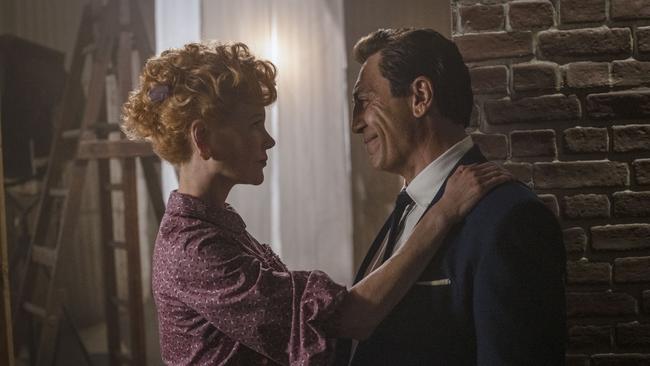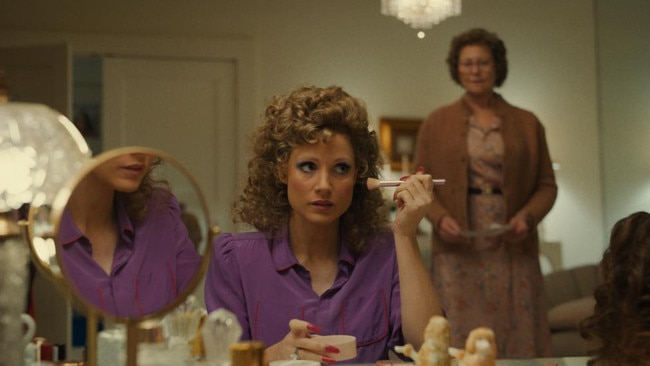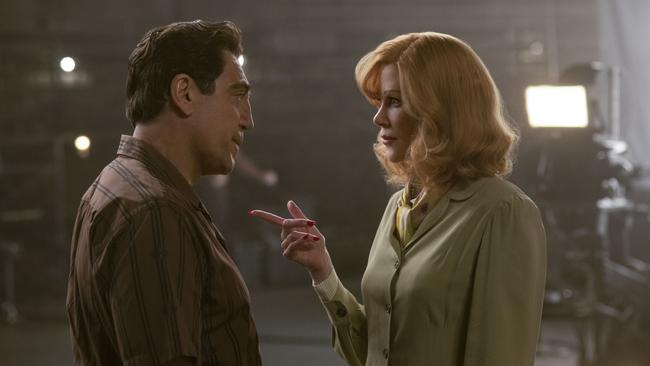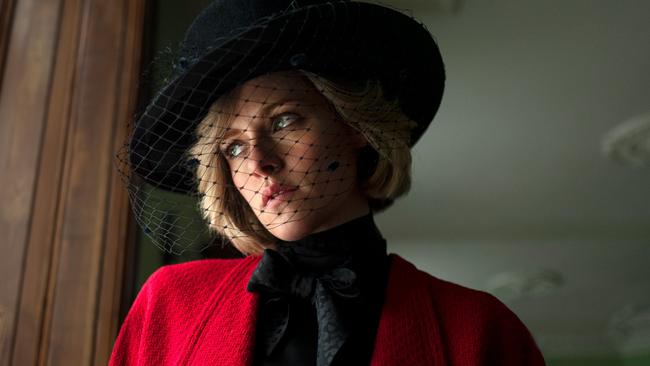A new kind of drama is turning the Oscars on their head
The big lesson for this year’s Academy Awards is that drama of the most formidable kind can work for a mass audience without dissipating itself in art-house wankery.

Has the world gone mad with this year’s Oscars or have they always been bat crazy? We’re told that Jessica Chastain’s chances of winning the best actress award for The Eyes of Tammy Faye went up after winning the Screen Actors Guild Award for playing that evangelical lady, and good on her. She’s as fine an actress as contemporary Hollywood can proffer. But this year’s Academy Award nominations resemble the weirdest kind of assortment bag. The latest word from the wise is that Troy Kotsur could win Best Supporting Actor for CODA, the English-language remake of the French film La Famille Belier. And there’s no reason why he shouldn’t.
We know – because we have all benefited from it in a time of plague with Covid – that this has been the year of the streamers but it does seem boggling that Aaron Sorkin’s Amazon film Being the Ricardos about Lucille Ball and Desi Arnaz, the stars of the long-ago I Love Lucy sitcom, should be poised for awards with Nicole Kidman and Javier Bardem possibilities for best actress and best actor. The movie was good (Kidman is at her best in comedy – her greatest performance is in that dark and deadly Gus Van Sant satire To Die For) but can Being the Ricardos really hold a candle to the lauded streaming series such as Mare of Easttown with Kate Winslet, or to It’s a Sin from Britain (with its devastating depiction of AIDS), or to White Lotus with a group of people led by Connie Britton falling apart at a resort and Australia’s Murray Bartlett performing an extraordinary act of vengeance?
None of which is meant to downgrade what is being put forward at the Oscars. It merely highlights the superiority of the streamer miniseries over many of the streamer telemovies. Don’t Look Up with Leonardo DiCaprio and Jennifer Lawrence is a wonderfully droll picture about the end of the world, and who could object to Paul Thomas Anderson recapitulating the 1970s in Licorice Pizza? You expect these sorts of best picture/best director nominations, even if something like Kenneth Branagh’s Belfast with its emphasis on the personal slant in the face of political atrocity is bound to divide people with its neat black and white cinematography. A famous Australian director couldn’t stand more than five minutes of it. God knows what he made of the three-hour Japanese Drive My Car directed by Ryusuke Hamaguchi (in the best director and best international film category) which takes a group of interrelated, edgy and repercussive stories by Haruki Murakami and blows them up into a kind of epic movie, much of it brilliantly executed.

When it comes to the best actor award, is any fraction of the Academy going to fall for the velvety charm of Will Smith in King Richard as the father of the tennis star Williams girls?
Then again what are we to make of the others? Bardem is expert and unexceptional as Desi Arnaz. It’s also a bit astonishing that Denzel Washington should have been nominated for his performance as Macbeth. Is this just marks for trying? He’s not as good as Michael Fassbender was for Justin Kurzel only a few years ago and you might like to watch Ian McKellen and Judi Dench doing it back in the 1970s or indeed Sean Connery and Australia’s Zoe Caldwell in the ’60s.
And speaking of Kurzel, what are the Oscars doing ignoring Nitram, his Martin Bryant film which had high claims to be seen as the best piece of filmmaking of the year with a staggering central performance from Caleb Landry Jones and devastating support from Judy Davis and Essie Davis. It’s there for everyone to watch on Stan, just as The Power of the Dog is streaming on Netflix.
Is this going to be Jane Campion’s year with The Power of the Dog? She already has set records with her 12 nominations and it would be good to see the Kiwi director, so long based in Sydney, get best picture, best director, and the appropriate acting awards. The woman who made Two Friends – the Helen Garner story that runs backwards (and is the finest filmic capturing of Garner’s work) – has been a force to be reckoned ever since she made The Piano with Holly Hunter and Anna Paquin when she was still a girl. She doesn’t need the Oscars that may be flooding her way given the immensity of her reputation – though they could be an appropriate accolade.
It helps in the appropriateness stakes that Campion has made a seriously weird film about a sexually repressed cowboy and this has yielded a performance of furious and ghastly magnificence by Benedict Cumberbatch. Is it better or on a par with the performance he gave in the Tom Stoppard TV adaptation of Ford Maddox Ford’s Parade’s End? Maybe not, but it is the detailed and riveting work of a great actor.

There’s flawless support on all sides. Kirsten Dunst plays a lovely woman who becomes a fluttering lush, and Jesse Plemons is equally strong as her plain reliable husband – and both are up for supporting awards. The person who should get the supporting actor award, however, is Kodi Smit-McPhee. We’ve watched his work here since he was a child actor. We’ve seen him directed by Nadia Tass and we’ve seen him wander the detritus of a destroyed world with Viggo Mortensen in Cormac McCarthy’s The Road. In The Power of the Dog he becomes the gleam in Cumberbatch’s self-annihilating eye, and Smit-McPhee’s performance, full of grace and stealth, is shaded by the suggestion that he is some kind of angel of death, a force that blows out the candle with a breath. The Power of the Dog is beautifully shot by Australia’s Ari Wegner.
Does it make sense for us to root patriotically and nationalistically for something like a film? Is there any point in the aesthetic equivalent of crying “Aussie, Aussie, Aussie” in the case of something as subjectively apprehended as a film? Perhaps there is when the Oscars come with some form of revelation. Think of the way the whole world was staggered by Geoffrey Rush in Shine. That was a genuine breakthrough and discovery.
It’s not unreasonable to want the home product to shine when it should. If Campion’s moment has come – or come again – then why not barrack for her against Paul Thomas Anderson’s Licorice Pizza or Guillermo del Toro’s Nightmare Alley but only if you think it’s the better film. Just don’t pretend Kidman’s very respectable performance as Lucille Ball in Being the Ricardos is a remarkable achievement.

It has always been the case that Hollywood is inclined to miss the breakthrough moment when it comes. Just think of the way it failed to give an Oscar to Peter O’Toole for Lawrence of Arabia, which must be one of the greatest performances of all time.
The thing that makes us hate the Oscars when we do is the way they make us attend to things we wouldn’t normally bother with. If you happen to think that everything that could be done to that science fiction epic Dune had been done by David Lynch back in 1984 then you’re not likely to be grateful for the remake with Timothee Chalamet, much as he’s great as a hipster boy of evangelical background in Don’t Look Up. He even says the final prayers before everything goes boom.
One pet hate that must be widely shared among the Oscar fodder is Spencer, which features Kristen Stewart as Princess Diana. It is a hellishly horrible bit of art-house twaddle and Stewart pouts and pounces and preens and tears every passion to tatters in a vehicle so pretentious that it makes you cling to The Crown, God help us, as an abiding touchstone of aesthetic excellence.

Her TV majesty of recent years Olivia Colman is in the running for best actress again – she won it for The Favourite – in this case for The Lost Daughter from the Elena Ferrante novel. It’s a beautifully observed performance in the all-but-taboo area of the mother who runs away. Her daughter is played by that formidable actor Jessie Buckley, also nominated for best supporting actress.
How can any of them compete with the great Penelope Cruz in Pedro Almodovar’s Parallel Mothers? Well, it’s a virtual impossibility when she acts in her native Spanish for someone whose reputation is as high, or higher, than any other director in the world. We have to remember that the Oscars can only be won by anyone every so often – even Katharine Hepburn was not allowed to bring it home every year. And neither was John Ford.
It still makes it strange when Steven Spielberg, the man who transformed the very idiom of cinematic language, decides that he wants to make a famous musical like West Side Story, never mind that it was made into a very successful film in the early ’60s by Robert Wise and that this still very watchable version garnered a lot of Oscars in its day.

Could West Side Story actually win best picture and best director? At its most stylised rather than at its most grittily naturalistic, the Spielberg version has a gripping authority. The casting and the music, however, are on a smaller scale than in the Wise version. But the Spielberg West Side Story is nothing if not watchable and the Somewhere from the veteran Rita Moreno is heartbreaking. It’s all a reminder too of the fact that the American musical is arguably the one homegrown American art form and its hold on the popular imagination is mighty, even as it’s flooding through the long memory of a master such as Spielberg.
But we are at some sort of crossroads with the Oscars at the moment. There was also the short-lived, slightly philistine proposition of an Academy Award for best popular film. Twitter set up an Oscar Fans Favourite that was ultimately won, according to Variety, by Spider-Man: No Way Home.
The lesson of the streamers is that very upper-level drama often of the most formidable kind – bridging the gap between miniseries and film – can work for a mass audience without dissipating itself in art-house wankery. This can make some of the nominations look like a ritual penance that Hollywood is making to the ideal of seriousness.
What is weird, though, is the way the Oscar nominations seem to have a more than usually arbitrary relationship to what has been released, much of which has already been streamed. Hollywood itself seems confused by the upshot and more than usually uncertain about quality and range.
But if you find yourself transfixed by what’s happening at the Dolby theatre on March 28 (Australian time) with Regina Hall and Amy Schumer leading a mob of hosts, bear in mind that you’re looking at the most famous of all award ceremonies in a very strange state of transition.




To join the conversation, please log in. Don't have an account? Register
Join the conversation, you are commenting as Logout